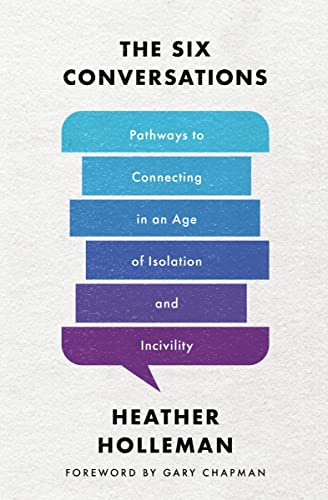

Reading “The Six Conversations: Pathways to Connecting in an Age of Isolation and Incivility.” affirmed many previously held understandings about conversations and their role in healthy relationships.
My introduction to Heather Halleman and “The Six Conversations” came via a “No Small Endeavor” podcast . The podcast is an excellent and convenient introduction.
I was hooked after hearing :
“The most loving thing we can do is have meaningful conversations.”
This post is primarily citations from Chapter 2. I believe Heather’s insights on Theology of a Loving Conversation are more than adequate to establish a theological basis for loving conversations.
Succeeding posts will address some implications I believe loving conversations could have on one’s faith journey.
Chapter Two – Theology of a loving conversation
Do nothing from selfish ambition or conceit, but in humility count others more significant than yourselves. Let each of you look not only to his own interests, but also to the interests of others. (Phil. 2:3)
My loving conversations, rooted in Philippians 2, became my primary act of service and the way I humbled myself to take on the nature of a servant. As I continued to grow in the art of a loving conversation, I found so much biblical support for the Four Mindsets. Paul’s command to discover the interests of others related directly to my becoming a curious person.
Honoring others related to positive regard, and I found more commands to walk “with humility toward one another” (1 Peter 5:5).
Paul even tells us to “outdo one another in showing honor” (Rom. 12:10). But what about the idea of investment and expressing concern about others?
Paul tells us to “rejoice with those who rejoice [and] weep with those who weep” (Rom. 12:15) and to “carry each other’s burdens” (Gal. 6:2 NIV). How would I know how to rejoice if I never ask about anyone’s good news? How would I encourage and comfort others if I never ask about how they are struggling?
And, most vitally, how could I continue in my past ways of selfishness if I ever wanted to uphold Jesus’ command to love one another as He has loved me (John 15:12)?
…consider the command to share our lives in verses like James 5:16: “Therefore, confess your sins to one another and pray for one another, that you may be healed.” Telling other people how we’re struggling invites this kind of prayer and healing. It’s also a way to allow the often-quoted verse in Proverbs 27:17 to come about: “Iron sharpens iron, and one man sharpens another.” Allowing this “sharpening” involves humility and the willingness to live vulnerably.
Paul seems especially passionate about the importance of sharing one’s life as he penned the first letter to the Thessalonian church. He explains how delighted and ready he was to “share with you not only the gospel of God but also our own selves” (1 Thess. 2:8). I read this verse carefully as a young professional who wanted to build a philosophy of living as a teacher and friend. What would it mean to share my “own [self]” in the work God had called me to do as a teacher, mother, and friend? Sharing my life with others—my struggles, my hopes, my fears, and my victories—would forever become part of the art of conversation and a vulnerable risk I would choose to take over and over again.
If we look deeper into this idea of sharing “our own selves” from a biblical perspective, we might consider John 17 and the way Jesus prays for believers. Jesus prays that we would “be one” together just as the Father was in Him (v. 21). Think about the commands in Scripture to have “unity of mind” (1 Peter 3:8); to see ourselves as “one body” who are “members one of another” (Rom. 12:5); to understand our baptism into “one body—Jews or Greeks, slaves or free” (1 Cor. 12:13); and to live so interconnected that if someone “suffers, all suffer together” and if someone “is honored, all rejoice together” (1 Cor. 12:26).
Essentially, Jesus’ desire for our interconnectedness reflects what the science of relationships now confirms. To put it simply, think of the famous quote from C. S. Lewis, who writes that all friendship comes from that moment when someone says, “What? You too? I thought I was the only one.”
When you share mutually, you find the connection on which all great relationships depend.Finally, God marvelously shares His life with us. The incarnation of God—who came to earth and made His dwelling among us—shows us God’s desire to share and give up His very life to make a way for us to know Him. And He gives us the greatest gift of the Holy Spirit so we might experience union with Him. The Lord shares His thoughts with us as the Holy Spirit uses Scripture and prayer to communicate with His people. In Psalm 25:14, we read how “the friendship of the LORD is for those who fear him, and he makes known to them his covenant.”
God desires intimate connection with us, and Jesus gave up His life on the cross that we might be in conversation with the living God. Jesus Himself opened up and shared His sorrow in the garden of Gethsemane as told in Matthew 26:38. He says, “My soul is very sorrowful, even to death; remain here, and watch with me.” That moment of vulnerability reminds me that God desires connection.
Conversations matter to God, and He models a perfect way to connect with others.I want to grow in my ability to connect with others through loving conversations. I want to see conversations as a sacred space. Let’s think about our next conversation as a way to honor others above ourselves, to value others above ourselves and take an interest in them, to encourage one another, to demonstrate kindness and compassion, and ultimately, to love people. When we do this, we reflect God’s character.
STILL ON THE JOURNEY



